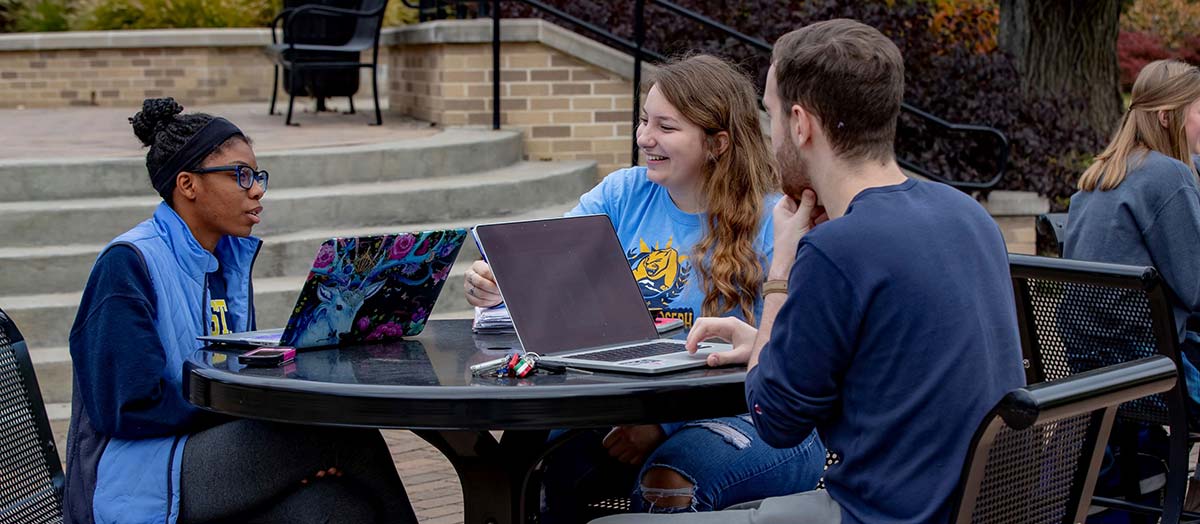The Mount offers quite a few extracurricular activities and clubs, but one group that stands out as one of the more immersive and camaraderie-inspiring is the Ethics Bowl.

The Mount offers quite a few extracurricular activities and clubs, but one group that stands out as one of the more immersive and camaraderie-inspiring is the Ethics Bowl.
Sprung out of a love for philosophical contemplation and critical thinking, this international competition challenges participants to think outside of the box and work together to garner even greater problem-solving skills. Similar to mock trials, participants are sent 15 real-life ethical issues by the Ethics Bowl Committee to prepare for, though only nine are chosen for the competition.
The Ethics Bowl is organized by the Association for Practical and Professional Ethics (APPE), and most major local universities compete, including Xavier, the University of Cincinnati, Miami, and Northern Kentucky University. However, due to the continuing pandemic, there are fewer schools and people participating, according to philosophy professor Iris Spoor of the Liberal Arts Department.
Usually, the competitions take place at a university, but since COVID-19 hit, there inevitably had to be changes.
“Normally it’s in-person,” Spoor says. “In our region, we compete at Marian University in Indianapolis. But last year it was all done over Webex. I know that some regions are doing them over Webex and Zoom this year. Our region is currently planning for in-person, but they said we need to be ready to go online because with the delta variant, we’re not really sure.”
Mount senior and Early Childhood Education Major Olivia Matt, a 2020 participant in the Ethics Bowl, states, “My experience was entirely virtual because of COVID but I still felt like I gained a lot from the video conference experience.”
Regardless of the location or platform, the Ethics Bowl remains significant, fun, thought-provoking, and intriguing. Some of the topics already sent out, for instance, include the filibuster, critical race theory, Bitcoin, vaccine incentives, and doxing.
“The case will describe the situation to you,” Spoor notes. “But one of the jobs of the teams is to figure out what the real ethical angle is in the case. So it’s really a fun aspect of the Ethics Bowl that teams and students get to decide what angle they want to go with it, and another fun thing is, as we discuss these cases and the teams discuss the cases, they sometimes find that their own opinion changes.” The mind-expanding qualities of the Ethics Bowl prove to be invaluable and beneficial, but it doesn’t end there.
In 2011, a Ethics Bowl course was created by Spoor’s predecessor Adam Konopka and business and psychology professor Missy Houlette to help students prepare for the Ethics Bowl while also gaining three ethics credits. Spoor took over this course, called Contemporary Moral Debate (ETH:PHI 204), in 2014. After going over ethical theory, students get to pick their favorite topics, are organized into teams, and discuss their assigned cases in class. Possible objections are introduced and arguments are refined.
The class is an accelerated, eight-week course and is “really fun,” Spoor states, “because it’s limited to 12 students. So the vibe of it is a lot more like a grad seminar where you're kind of talking about cases and just discussing things in a group like one big group discussion. And for students, I think it's a really different kind of class, in that way.”
But probably the most indelible reality of the Mount’s Ethics Bowl teams is the academic strength of unity. Considering that MSJ does not have a formal philosophy major the Mount’s teams have broader and more varied insights.
“So one thing at the Mount that makes us different,” Spoor says, is “we’ll have students from so many different backgrounds on one team. We might have someone in criminology, someone in biology, and they all have different knowledge. This is a huge factor in making a team really prepared and bringing out different angles of a case. If everybody was a philosophy or ethics major, they may not think of some of these things because they don’t come from those other types of backgrounds.”
What’s more, the Ethics Bowl and the students involved have an unparalleled sense of maturity, civility, and respect for one another, according to Spoor. Each team is given an allotted time to present their cases without interruption and it is often that the opposing team will agree.
“It’s a lot more like going to an academic conference than it is like a confrontational debate,” Spoor states, “so I hope when people hear that word ‘debate,’ they don't think of something confrontational because it's not. One really nice thing is you're with your team so you can help each other out and depend on each other so you don't feel like all the attention is on you the way that might happen in a traditional political debate.”
The Ethics Bowl is a team-based undertaking, with some of the Mount’s best and brightest. MSJ’s teams have each other’s backs—there is no better support system.
“I absolutely would recommend this experience,” says Matt. “I am normally a shy person, and being able to voice my opinion on difficult topics and be able to back those opinions up was very rewarding. I loved it so much I even tried to recommend this course to my friends and boyfriend who had already filled the Ethics course requirement. If I had the chance I would do this all over again. It is truly a once-in-a-lifetime experience.”
If you are interested in joining the Ethics Bowl or the Contemporary Moral Debate class in the future, or merely want additional information, contact Iris Spoor at Iris.Spoor@msj.edu or Missy Houlette at Missy.Houlette@msj.edu.

